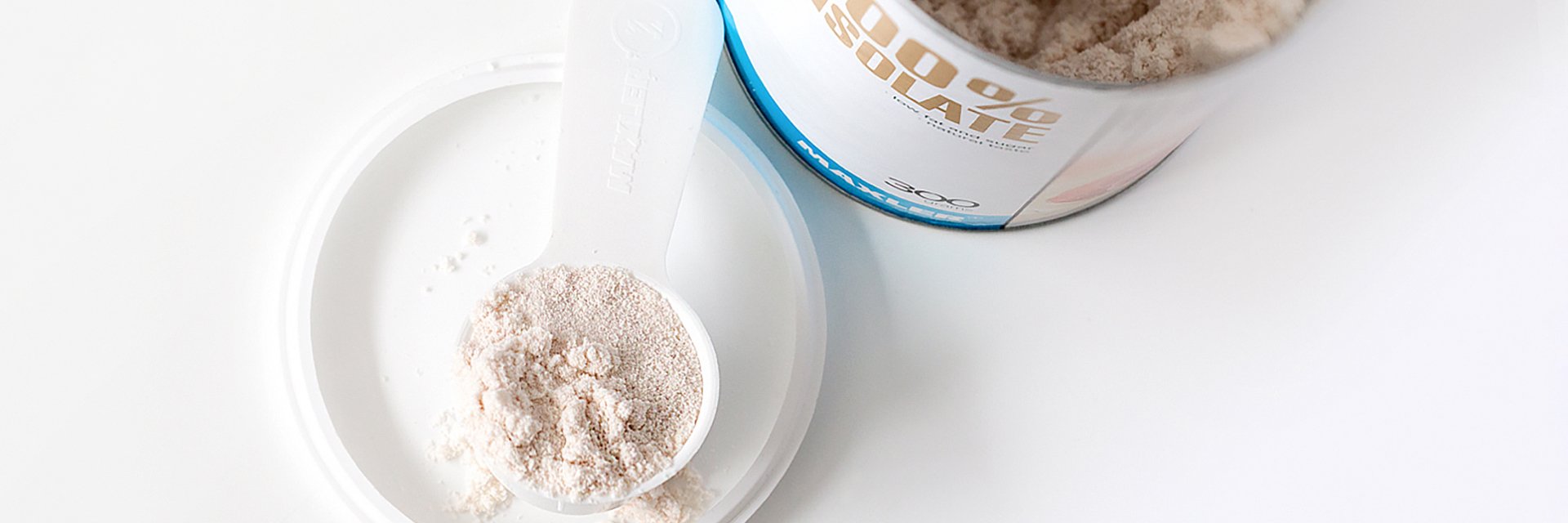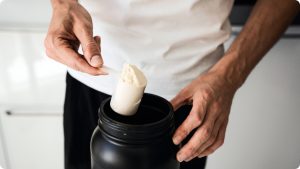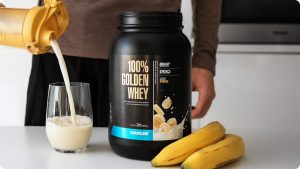No matter where you are in your fitness journey, you’ll likely want to try a protein powder. Therefore, it pays off to know exactly what the different types of proteins available are. Two common ones are protein isolate powder and protein concentrate powder.
In this post, we’ll look at whey concentrates and isolates specifically. However, it’s worth noting that vegan protein concentrates and isolates exist. The logic in these products is the same – isolates will have a higher protein content per portion. However, the type of protein will differ, as whey protein comes from milk, and vegan protein is usually from soy, pea, or rice.
What is protein concentrate?
When most people say protein powder, they usually mean whey protein concentrate powder. Most people use whey concentrate powder, which is one of the most popular supplements. That may be partly due to its accessibility, as it’s usually the cheapest protein option.
Protein concentrate tends to be less than or equal to 89% of protein by weight. It has a high content of essential amino acids, including leucine. This makes it attractive to those who are looking to grow muscle.
Whey protein has plenty of known benefits, including:
- Helping you stay full, as it impacts hunger hormones
- Improving muscle mass and body composition by helping you preserve lean muscle mass
- Some proteins in whey have antimicrobial properties
- Supporting bone health, as a high protein diet, especially in older age, can help with bone mass
- Assisting with weight loss
Whey protein concentrate powders may have different amounts of protein, calories, fats and sugars, depending on who they are manufactured by. Therefore, when choosing one, it’s best to pay attention to the nutrition labels to help you make the right choice.
What is a protein isolate?
A protein isolate is simply a whey protein that is further processed to increase its protein content. An isolate is around 90% protein by weight, meaning that you’ll get more protein in a serving.
The benefits of whey protein isolate and concentrate are very much the same. This is because they consist of the same type of protein, whey, just in different proportions. Therefore, if you take it alongside a strength training routine, you will be able to grow more muscle.
Difference between protein concentrate and protein isolate
So, to help summarize, what are the main differences between isolate and whey protein concentrate?
- Protein content. Protein isolate has more proteins per 100 grams of the product. Isolates will be 90% protein, so a portion of 30 grams of isolate will have 27 grams of pure whey protein.
- Fat and carbohydrate content. Protein isolate powder tends to have less fat and carbs in a product serving.
- Processing amount. Protein isolate undergoes more processing to make the protein more concentrated and remove more fat and carbohydrates.
- Lactose content. Protein isolate is naturally lower in lactose than whey. However, they both have it. If you can’t tolerate lactose, choose a lactose-free protein.
- Cost. Whey protein concentrate requires less processing and, therefore, is usually cheaper than isolate.
The production process of isolates and regular proteins
Whey concentrates and whey isolate protein is produced similarly. The first step starts in a pasture, where cows graze. They are milked, and their milk is sent to cheese factories.
Milk is made of about 80% casein and 20% whey proteins. When the milk begins transitioning to cheese, we add rennet, which coagulates the casein protein. The resultant product is a mass that will become cheese and the liquid whey. Liquid whey is then collected. In fact, 9 liters of liquid whey are obtained for about a kilogram of cheese.
For a long time, this liquid whey was just thrown out. But with time, we came to understand that there was a lot of use we could get out of this product.
Whey protein is obtained using a process called ultrafiltration. The whey is passed through a membrane that acts like a sieve, allowing lactose and minerals in the whey to go through. The protein is retained, as it doesn’t pass through this membrane. After that, the whey protein can undergo evaporation and concentration. This forms the concentrate.
The dry whey is further processed to remove everything that’s not a protein, using different separation techniques to obtain a whey protein isolate.
Examples of Use
Whether you’re choosing a whey concentrate powder or a whey isolate, the beauty of them lies in their ease of use.
There are many ways to use a protein supplement. The simplest one is to make a protein shake. To do so, mix your protein concentrate or isolate with some water or milk according to package directions. That will result in a convenient protein boost that you can have at home, in the gym, or even on the go. You might fall in love with an exotic flavor of your protein, like the fan-favorite 100% Golden Whey Blueberry Muffin Flavor.
Alternatively, concentrate and isolate protein powders can be used to enrich meals low in protein. For many of us, breakfasts are either non-existent or low in protein. We may grab a fruit smoothie, have some cereal, or even just drink some coffee. However, that often doesn’t quite hold us over before lunch.
Having protein at breakfast can help keep us full and cut down snacking during the day, which is super useful if you’re trying to lose weight.
You can add protein powder to your breakfast foods. Overnight oats or oatmeal, pancakes, muffins, smoothies, or yoghurts are all great options to add a scoop of protein powder to.
What to choose?
Now that you know the difference between whey protein concentrate and isolate, a question remains. Which of these should you choose?
Both protein types are useful for increasing your protein intake. However, there can be instances where a protein isolate may suit you better than a concentrate. For example, if you’re trying to lose weight or are preparing for a competition by improving your body composition, an isolate will be preferable. That’s because of its higher protein content per serving, alongside the same amount or less calories than a protein concentrate.
But, no matter which one you choose, there are certain things to watch out for when choosing any protein powder:
- Protein powder quality. Choose protein powders from brands that are open about their sourcing and their quality standards. It’s better to spend more time searching for a high-quality product than be disappointed by a lower-quality one. All Maxler protein powders are made in GMP and IFS-certified factories. We pride ourselves in our tight quality control.
- Protein powder macros. You need to make sure that your protein powders fit into your lifestyle seamlessly. If you’re aiming to cut down your calorie intake, choose lower-calorie protein powders.
- Additional ingredients. Sometimes, protein powders may have additional ingredients in them, for example, those said to promote fat burning. Do your research and check whether you need and want to pay extra money for them. Alternatively, other proteins may have additional ingredients you want. For example, all Maxler protein powders contain a DigeZyme complex. These enzymes help you digest the protein powder better and get the most out of it.
- Your personal dietary requirements. Don’t be afraid to experiment with different protein powders and see what works. Many people may prefer the taste or texture of a vegan protein powder or may need to look for a lactose-free powder that doesn’t upset their stomach.
- Flavor and texture. So much of your ability to benefit from a supplement relies on you taking it consistently. Choose protein powders that have a taste and texture you enjoy. Maxler protein powders are known for their incredible range of tastes, and you might find one that you absolutely adore!
Protein concentrates and isolates differ in their protein, fat, and carbohydrate content. Therefore, certain people may prefer to use protein isolates, especially if they’re in a calorie deficit. However, no matter what type of protein powder you chose, it’s key to find one that is high-quality and fits your tastes. Together with the right protein powder, you can get to the goals you’ve set for yourself!









